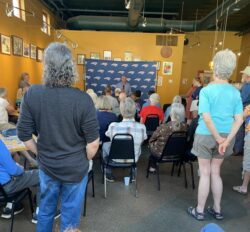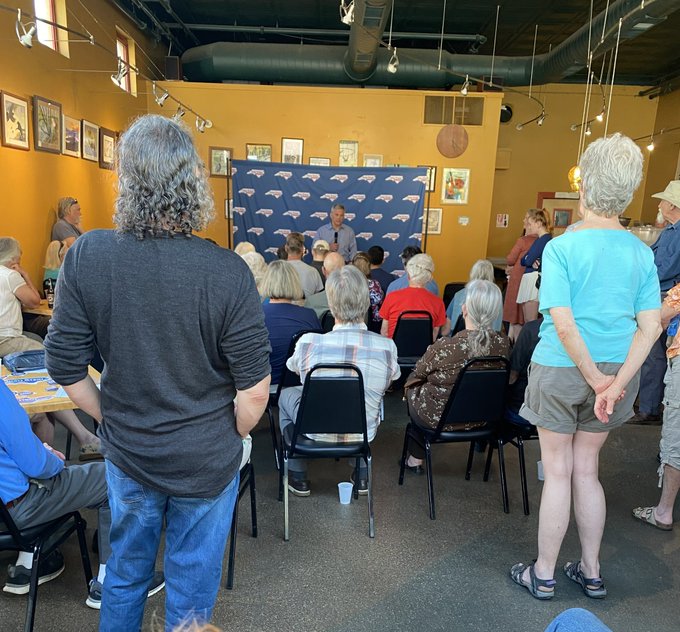Democrats’ Country Inroads
New data shows that North Carolina Democrats are right to look for votes on country roads and small-town streets.
A group called Rural Democracy Initiative – “Communities, Not Corporations” – will release a poll next month saying that “rural voters tend to be economic populists who would overwhelmingly support parts of the Democratic Party’s agenda — as long as the right messenger knocked on their doors.”
Anderson Clayton has been pounding on that message since before she was elected state party chair last year.
Rachel Hunt, the Democratic nominee for lieutenant governor, is campaigning hard in rural areas and small towns, like Mount Airy last week.
Hunt, who spent much of her early life on her family’s farm, is reviving the 100-county key system made famous by her father, former Governor Jim Hunt.
Josh Stein has taken his campaign for governor to Scotland, Haywood, Burke, Alexander and Madison counties the last couple of weeks. (Photo is from his stop in Marshall.)
The poll interviewed 1,713 likely voters from rural areas and small towns in 10 battleground states.
Three-fourths of them, 74 percent, said decisions on abortion should be made by women and their doctors, not politicians or the government: the Democratic position.
The poll also found overwhelming support for raising the minimum wage, protecting the right to form a union and making quality child care more affordable — all Democratic policies.
But, The New York Times reported, “a significant number of the respondents didn’t associate these policies with Democrats.”
And, “perhaps the biggest problem the survey uncovered was that large numbers of respondents — especially young voters and people of color — reported that no one from the Democratic Party had reached out to them to offer information or ask for their support.”
This year, North Carolina Democrats are reaching out, knocking on these voters’ doors and walking down roads and streets the party ignored too long.
As Farah Stockman wrote in The Times, “In an election in which a few thousand votes could decide who wins the presidency or controls the Senate, it’s foolish to write off rural America.”
In North Carolina, a few thousand votes could decide the races for governor, lieutenant governor, Supreme Court, Council of State and the legislature.

Democrats’ Country Inroads

New data shows that North Carolina Democrats are right to look for votes on country roads and small-town streets.
A group called Rural Democracy Initiative – “Communities, Not Corporations” – will release a poll next month saying that “rural voters tend to be economic populists who would overwhelmingly support parts of the Democratic Party’s agenda — as long as the right messenger knocked on their doors.”
Anderson Clayton has been pounding on that message since before she was elected state party chair last year.
Rachel Hunt, the Democratic nominee for lieutenant governor, is campaigning hard in rural areas and small towns, like Mount Airy last week.
Hunt, who spent much of her early life on her family’s farm, is reviving the 100-county key system made famous by her father, former Governor Jim Hunt.
Josh Stein has taken his campaign for governor to Scotland, Haywood, Burke, Alexander and Madison counties the last couple of weeks. (Photo is from his stop in Marshall.)
The poll interviewed 1,713 likely voters from rural areas and small towns in 10 battleground states.
Three-fourths of them, 74 percent, said decisions on abortion should be made by women and their doctors, not politicians or the government: the Democratic position.
The poll also found overwhelming support for raising the minimum wage, protecting the right to form a union and making quality child care more affordable — all Democratic policies.
But, The New York Times reported, “a significant number of the respondents didn’t associate these policies with Democrats.”
And, “perhaps the biggest problem the survey uncovered was that large numbers of respondents — especially young voters and people of color — reported that no one from the Democratic Party had reached out to them to offer information or ask for their support.”
This year, North Carolina Democrats are reaching out, knocking on these voters’ doors and walking down roads and streets the party ignored too long.
As Farah Stockman wrote in The Times, “In an election in which a few thousand votes could decide who wins the presidency or controls the Senate, it’s foolish to write off rural America.”
In North Carolina, a few thousand votes could decide the races for governor, lieutenant governor, Supreme Court, Council of State and the legislature.